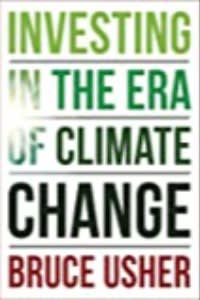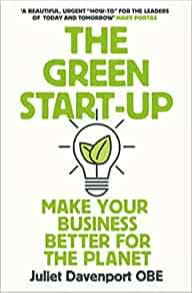Best new books on the environment
Are you an investor looking to make a buck from the shift to clean energy? Or would you like to launch your own green start-up? Perhaps you have zero interest in business and just want to know how to make a difference to a gathering global climate crisis.
There is an answer for everyone in a new and pleasingly diverse list of climate change books, but first a word about the one you are likely to see first in a bookshop: The Climate Book “created” by Greta Thunberg (Allen Lane, £25).

The Swedish activist has not written this handsomely presented book herself. Instead she has persuaded the likes of Margaret Atwood, Naomi Klein and Thomas Piketty to join a team of more than 100 writers, activists and researchers who have each written an essay on climate change.
Some succeed more than the others, and the total package is unlikely to reveal much that anyone with a serious interest in the topic does not already know. But it is an attractive Christmas present for those seeking an overview of the problem and how some thinkers would deal with it.
Many of Thunberg’s contributors regard business, and indeed 21st-century capitalism, as more of a cause than an answer to a warming planet.
But Columbia University’s Professor Bruce Usher, who has been investing in climate solutions since 2002, makes the opposite case in his book, Investing in the Era of Climate Change (Columbia University Press, $27.95/£22.00).

Usher has been investing in climate change ventures since 2002, when the green investment opportunities were far less attractive than they are today. He argues the falling cost and rising competitiveness of wind power, solar farms and other clean energy sources is good news for capitalists and the climate alike.
More than half of all emissions can be eliminated by renewables, energy storage and electric vehicles, he says. And there is plenty of evidence that countries can decarbonise and maintain economic growth.
For those who already run a business, or hope to, the UK’s Juliet Davenport has written The Green Start-up: Make Your Business Better for the Planet (Heligo Books, £16.99).

Davenport knows of what she speaks. She founded Good Energy, a pioneering supplier of renewable electricity, more than 20 years ago and became that rare thing: a female energy company chief executive. She stepped down as CEO last year and now chairs a solar power group that is believed to be the first of its kind to list on the London Stock Exchange with an all-female board.
Her book is full of practical tips for eco-conscious entrepreneurs, covering everything from the dos and don’ts of raising start-up money to managing culture clashes like the one she confronted after taking over a company that was largely run by men driven almost entirely by commercial priorities.
Merging this group with her gender-balanced, climate-committed staff took a lot of effort and it is real-life stories such as this that make the book invaluable reading.
Another guide to real-life climate action comes in The Big Fix: 7 Practical Steps to Save Our Planet by Hal Harvey and Justin Gillis (Simon & Schuster £20/$28.99).

Though written primarily for US readers, its main message applies well beyond American borders: it’s not enough to go vegan or cut out flying. Wider systemic change is needed and by focusing on the main policies needed to achieve this, individual “green citizens” can make a difference.
Finally, the influential US thinker and prolific author, Jeremy Rifkin, has a new book, The Age of Resilience: Reimagining Existence on a Rewilding Earth (Swift Press, £20).
Rifkin’s earlier titles — The End of Work, The Third Industrial Revolution, The Green New Deal — have attracted fans in government departments and bookshops alike.
In his new work, he returns to a familiar theme: what he calls the “efficiency imperative”, or the relentless quest to consume and discard natural resources to increase material wealth.
This concept underpinned what Rifkin calls the age of progress. But now, in an increasingly alarming world of warming temperatures and global pandemic, he thinks humanity is shifting to an age of resilience that could transform our relationship with the natural world and each other.

How might this play out? Rifkin sees a future of sweeping economic and social shifts where productivity gives way to regenerativity and gross domestic product to quality of life indicators. Consumerism, corporate conglomerates and globalisation all wither while “eco-stewardship”, high-tech co-operatives and “glocalisation” flourish.
The book will undoubtedly prove beguiling for many readers, even as it infuriates others. It is rarely different for a writer who has spent decades warning of the need to address environmental problems that the human species caused and is still struggling to fix.
Pilita Clark is the FT’s business columnist
Join our online book group on Facebook at FT Books Café